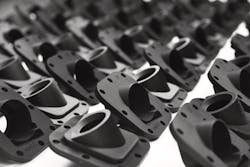Stratasys Bid to Buy Desktop Metal Fails, Company Seeking ‘Strategic Alternatives’
Stratasys’ top management failed to convince investors that its vision of merging its plastics and polymers 3D-printer technologies with rival Desktop Metal’s metal additive manufacturing systems provided the best paths to future profits.
Investors on Thursday rejected that deal–holders of a whopping 78.6% of Stratasys shares voted no–and the company’s board is now exploring “strategic alternatives,” corporate speak for putting the Israel- and Minnesota-based company up for sale. It already has two bidders: Rivals 3D Systems and Nano Dimension had submitted bids to buy Stratasys in recent months, and those two rivals had actively been encouraging investors to vote against the Desktop Metal purchase, as had investment firm Donerail Group, owner of more than 2% of Stratasys' stock.
Previous Stratasys-Desktop Metal Coverage
- Stratasys CEO Zeif: Additive Technology's Advances and Long-Term Challenges
- Stratasys Again Rejects 3D Systems, Urges Shareholders to Support Desktop Metal Purchase
- Stratasys CEO Zeif: How Additive Can Scale for Manufacturing
- Stratasys CEO Zeif: Why Now for Additive Manufacturing Mergers
- Stratasys Will "Engage in Discussions" on Acquisition by 3D Systems
- Stratasys Board Again Turns Away 3D, Nano Offers
- Stratasys Stiff-Arms 3D Systems' Bid
- 3D Systems Offers $1.2 Billion for Stratasys
- Understanding the Merger of Stratasys and Desktop Metal
- Stratasys to Buy Desktop Metal for $1.8 Billion
“We have decided to undertake a comprehensive and thorough review of all available strategic alternatives,” said Dov Ofer, chairman of Stratasys’ board of directors.
The rejection of the shareholder vote is a major rebuke of CEO Yoav Zeif’s vision for additive manufacturing’s future, something he spelled out at length in recent interviews with IndustryWeek and other publications. Zeif said combining metal and polymer technologies under one company would make 3D printing more attractive to manufacturers worldwide.
In addition to opposition from 3D Systems and Nano Dimension, Stratasys’ proposed deal with Desktop Metal also had failed to gain the endorsement of prominent proxy advisor Institutional Shareholder Services. That firm recently recommended investors vote against the plan and said 3D’s offer to buy Stratasys would be a better way to go.
“While the proposed transaction does not appear to be value-destructive, it is not clear that it creates value for [Stratasys] shareholders,” ISS analysts wrote. “[3D’s] alternative offer to acquire the company, by contrast, presents a more convincing route to value creation.”
Per the details of the failed transaction, Stratasys will be obliged to pay Desktop Metal a breakup fee of $32.5 million if its exploration of strategic alternatives results in another similar merger or acquisition plan over the coming 12 months. Stratasys also must reimburse Desktop Metal for up to $10 million in transaction-related costs.
In a statement following the vote, Desktop Metal founder and CEO Ric Fulop put on a brave face.
“We are completely confident in the trajectory of our business, which continues to lower operating costs while growing revenue,” Fulop said. “Our plan to reduce costs and generate revenue remains on track as customers continue transitioning to our AM 2.0 technologies for mass production of metal, polymer, ceramic and health products.”
About the Author
Robert Schoenberger
Editor-in-Chief
LinkedIn: linkedin.com/in/robert-schoenberger-4326b810
Bio: Robert Schoenberger has been writing about manufacturing technology in one form or another since the late 1990s. He began his career in newspapers in South Texas and has worked for The Clarion-Ledger in Jackson, Mississippi; The Courier-Journal in Louisville, Kentucky; and The Plain Dealer in Cleveland where he spent more than six years as the automotive reporter. In 2014, he launched Today's Motor Vehicles (now EV Manufacturing & Design), a magazine focusing on design and manufacturing topics within the automotive and commercial truck worlds. He joined IndustryWeek in late 2021.
Geert De Lombaerde
Senior Editor
A native of Belgium, Geert De Lombaerde has been in business journalism since the mid-1990s and writes about public companies, markets and economic trends for Endeavor Business Media publications, focusing on IndustryWeek, FleetOwner, Oil & Gas Journal, T&D World and Healthcare Innovation. He also curates the twice-monthly Market Moves Strategy newsletter that showcases Endeavor stories on strategy, leadership and investment and contributes to other Market Moves newsletters.
With a degree in journalism from the University of Missouri, he began his reporting career at the Business Courier in Cincinnati in 1997, initially covering retail and the courts before shifting to banking, insurance and investing. He later was managing editor and editor of the Nashville Business Journal before being named editor of the Nashville Post in early 2008. He led a team that helped grow the Post's online traffic more than fivefold before joining Endeavor in September 2021.

